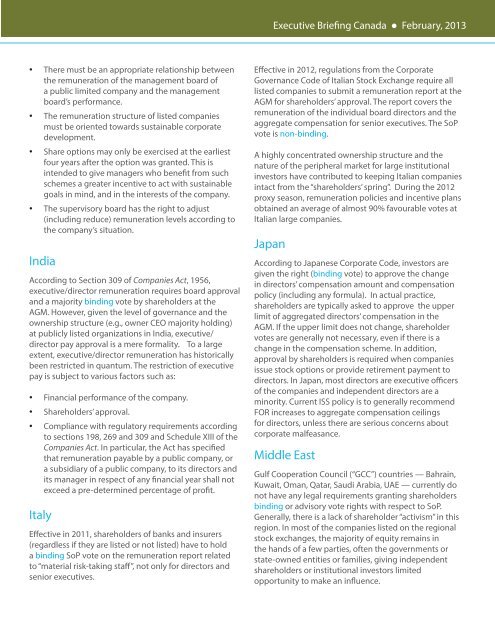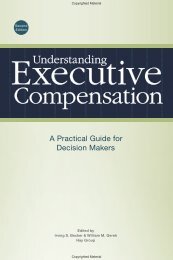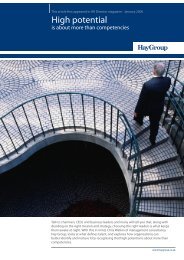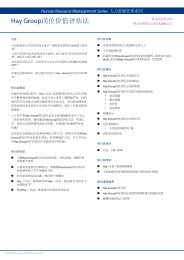Executive Briefing Canada - Hay Group
Executive Briefing Canada - Hay Group
Executive Briefing Canada - Hay Group
You also want an ePaper? Increase the reach of your titles
YUMPU automatically turns print PDFs into web optimized ePapers that Google loves.
<strong>Executive</strong> <strong>Briefing</strong> <strong>Canada</strong> ● February, 2013<br />
• There must be an appropriate relationship between<br />
the remuneration of the management board of<br />
a public limited company and the management<br />
board’s performance.<br />
• The remuneration structure of listed companies<br />
must be oriented towards sustainable corporate<br />
development.<br />
• Share options may only be exercised at the earliest<br />
four years after the option was granted. This is<br />
intended to give managers who benefit from such<br />
schemes a greater incentive to act with sustainable<br />
goals in mind, and in the interests of the company.<br />
• The supervisory board has the right to adjust<br />
(including reduce) remuneration levels according to<br />
the company’s situation.<br />
India<br />
According to Section 309 of Companies Act, 1956,<br />
executive/director remuneration requires board approval<br />
and a majority binding vote by shareholders at the<br />
AGM. However, given the level of governance and the<br />
ownership structure (e.g., owner CEO majority holding)<br />
at publicly listed organizations in India, executive/<br />
director pay approval is a mere formality. To a large<br />
extent, executive/director remuneration has historically<br />
been restricted in quantum. The restriction of executive<br />
pay is subject to various factors such as:<br />
• Financial performance of the company.<br />
• Shareholders’ approval.<br />
• Compliance with regulatory requirements according<br />
to sections 198, 269 and 309 and Schedule XIII of the<br />
Companies Act. In particular, the Act has specified<br />
that remuneration payable by a public company, or<br />
a subsidiary of a public company, to its directors and<br />
its manager in respect of any financial year shall not<br />
exceed a pre-determined percentage of profit.<br />
Italy<br />
Effective in 2011, shareholders of banks and insurers<br />
(regardless if they are listed or not listed) have to hold<br />
a binding SoP vote on the remuneration report related<br />
to “material risk-taking staff”, not only for directors and<br />
senior executives.<br />
Effective in 2012, regulations from the Corporate<br />
Governance Code of Italian Stock Exchange require all<br />
listed companies to submit a remuneration report at the<br />
AGM for shareholders’ approval. The report covers the<br />
remuneration of the individual board directors and the<br />
aggregate compensation for senior executives. The SoP<br />
vote is non-binding.<br />
A highly concentrated ownership structure and the<br />
nature of the peripheral market for large institutional<br />
investors have contributed to keeping Italian companies<br />
intact from the “shareholders’ spring”. During the 2012<br />
proxy season, remuneration policies and incentive plans<br />
obtained an average of almost 90% favourable votes at<br />
Italian large companies.<br />
Japan<br />
According to Japanese Corporate Code, investors are<br />
given the right (binding vote) to approve the change<br />
in directors’ compensation amount and compensation<br />
policy (including any formula). In actual practice,<br />
shareholders are typically asked to approve the upper<br />
limit of aggregated directors’ compensation in the<br />
AGM. If the upper limit does not change, shareholder<br />
votes are generally not necessary, even if there is a<br />
change in the compensation scheme. In addition,<br />
approval by shareholders is required when companies<br />
issue stock options or provide retirement payment to<br />
directors. In Japan, most directors are executive officers<br />
of the companies and independent directors are a<br />
minority. Current ISS policy is to generally recommend<br />
FOR increases to aggregate compensation ceilings<br />
for directors, unless there are serious concerns about<br />
corporate malfeasance.<br />
Middle East<br />
Gulf Cooperation Council (“GCC”) countries — Bahrain,<br />
Kuwait, Oman, Qatar, Saudi Arabia, UAE — currently do<br />
not have any legal requirements granting shareholders<br />
binding or advisory vote rights with respect to SoP.<br />
Generally, there is a lack of shareholder “activism” in this<br />
region. In most of the companies listed on the regional<br />
stock exchanges, the majority of equity remains in<br />
the hands of a few parties, often the governments or<br />
state-owned entities or families, giving independent<br />
shareholders or institutional investors limited<br />
opportunity to make an influence.
















